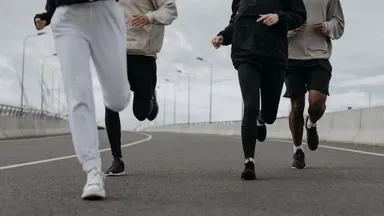
6 Wellness Trends to Watch in 2024
Last updated: June 23, 2025
The last four years have been marked by significant changes, including an economic downturn that has left many consumers financially constrained. More than half of consumers are currently experiencing stress due to their financial situation, and believe that the state of the economy has negatively impacted their mental well-being.
Despite challenging conditions, consumers are still prioritizing wellness. 76% agree that wellness has become more important than ever, with nearly half stating that they are now even more focused on their wellbeing due to the recent pandemic. Spending in this category has remained steady, and it's estimated that the U.S. wellness market reached $480 million at the end of 2023.
Mindbody conducts its annual Wellness Index to keep track of the constantly changing dynamics within the health and wellness space. This year we surveyed over 8,000 consumers to understand where the industry is headed.
Here are the 6 wellness trends you can expect to see in 2024.
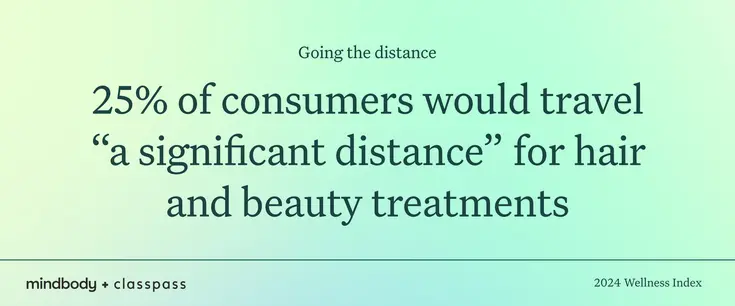
Going the distance: Beauty tourism is on the rise
The saying, "Beauty knows no bounds," takes on a whole new meaning with beauty tourism. People have been traveling abroad for years to receive more affordable cosmetic procedures such as hair transplants, plastic surgery, and dental implants. Turkey, India, and Mexico are just a few of the countries that rank in the top 5 for the best countries to get plastic surgery.
In 2024, we can expect more people to go to great lengths (and distances) to make sure they can see a coveted stylist or get more affordable beauty treatments. A quarter of consumers would travel a significant distance to for a specific beauty or grooming treatment, with a staggering 43% noting that facials and hair services are a necessity.
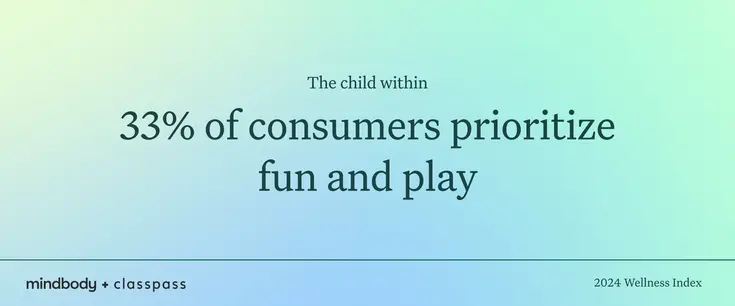
A movement towards embracing the child within
We often associate children with sports and the playing outside but in 2024 we will see more adults embrace nostalgic habits and join in on the fun. Three-quarters of consumers actively participate in outdoor exercise and sports, including walking, swimming, and hiking. The 2023 Look Back Report saw overall sports and recreation bookings on ClassPass increase by 92% from 2022, with Golf citied as the fastest-growing genre on the platform.
Additionally, 33% of consumers note that they prioritize fun and play specifically with a goal of supporting their well-being, underscoring this cultural shift to make time for joyful pursuits and rediscover the wonders of the great outdoors.
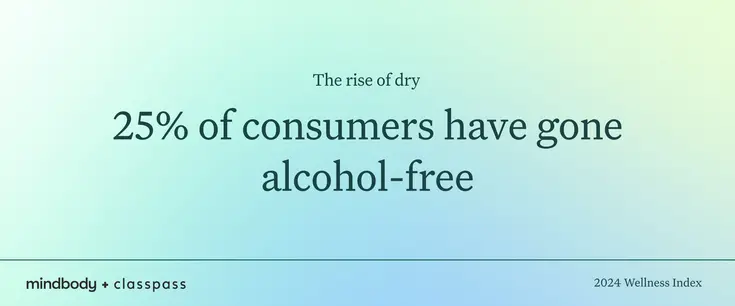
Saying goodbye to “champagne problems”
The nostalgia trend goes beyond just participating in recreational sports. "Dry January" is a post-holiday tradition where participants commit to a month-long hiatus from alcohol consumption to start the year fresh. Some consumers are taking it a step further in 2024. A remarkable 25% across all age groups have already embraced an alcohol-free lifestyle as part of their wellness routines and one in five individuals are contemplating joining this trend within the next 12 months.
The decision to eliminate alcohol can come with a myriad of potential health benefits, ranging from the repair of liver damage to a decreased risk of heart disease and cancer. The potential for improved sleep and better brain function further underscores the transformative impact of this wellness choice.
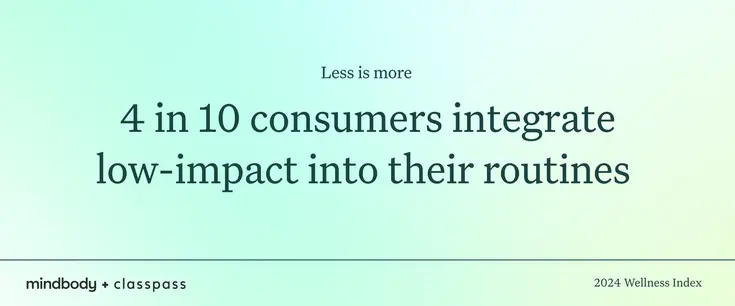
Low impact: For some, less is more
While weight training and cardio remain popular, many people are moving away from high-intensity workouts as the idea that "less is more" continues to gain traction.
4 in 10 consumers say they are integrating various low-impact exercises into their routines, like gentle yoga (17%), traditional yoga (16%), and martial arts (10%). 41% also say they prefer low-intensity exercises because to their calming and relaxing benefits. To see where bookings of low impact training and yoga ranked amongst other genres in 2023, check out the 2023 Look Back Report.
As for Gen Z and millennials, 41% are embracing a combination of both low and high-intensity workouts. They find this approach allows for more variety and a more holistic approach to fitness and say this preference not only allows for more options but also a deeper commitment to prioritize overall well-being.
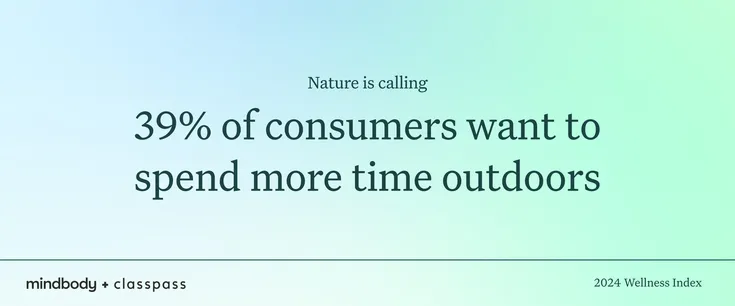
Nature is calling, and consumers are answering
39% of consumers recognize the importance of mental well-being and acknowledge that spending time outdoors can significantly contribute to a more balanced life while 52% say that outdoor walking is an essential part of their general fitness routine. With studies showing that spending just 20 minutes a day outdoors can help reduce stress levels, expect to see more consumers across generations set aside time to find these open-air opportunities.
Some consumers are taking their interest in nature a step further, with 17% considering adding Adaptogenic Mushrooms into their diets and 13% newly participating in camps or retreats that incorporate activities connecting to nature. When asked, the main benefits these consumers are looking to achieve outside of stress relief include anxiety reduction and better cognitive function.
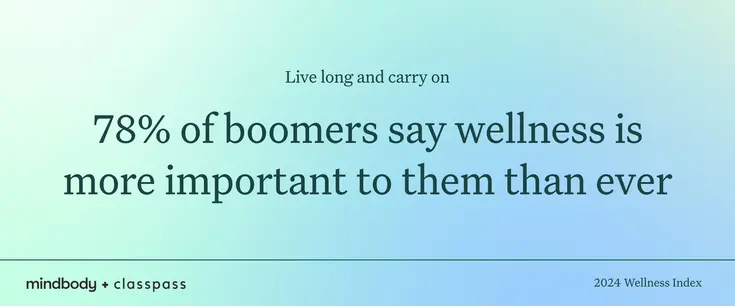
Boomers aim to live longer and better
78% of Boomers cite that wellness holds greater importance to them now than ever before. This generation is becoming a pivotal demographic for the industry due to their renewed commitment to health and well-being. 67% say that they prioritize health and wellness in order to live a long and healthy life, while 30% are motivated by a desire to maintain or improve mobility. Additionally, 85% believe that being physically active helps their mental health.
With many Boomers entering retirement, they also have additional time on their hands to dedicate to wellness. An impressive 52% exercise three or more times a week, highlighting their dedication to a healthy lifestyle.
Looking ahead to 2024, it's clear that consumers are committed to improving their physical and mental well-being. For more insight into what is on the horizon for the year, see our recently unveiled 2023 Look Back Report.

